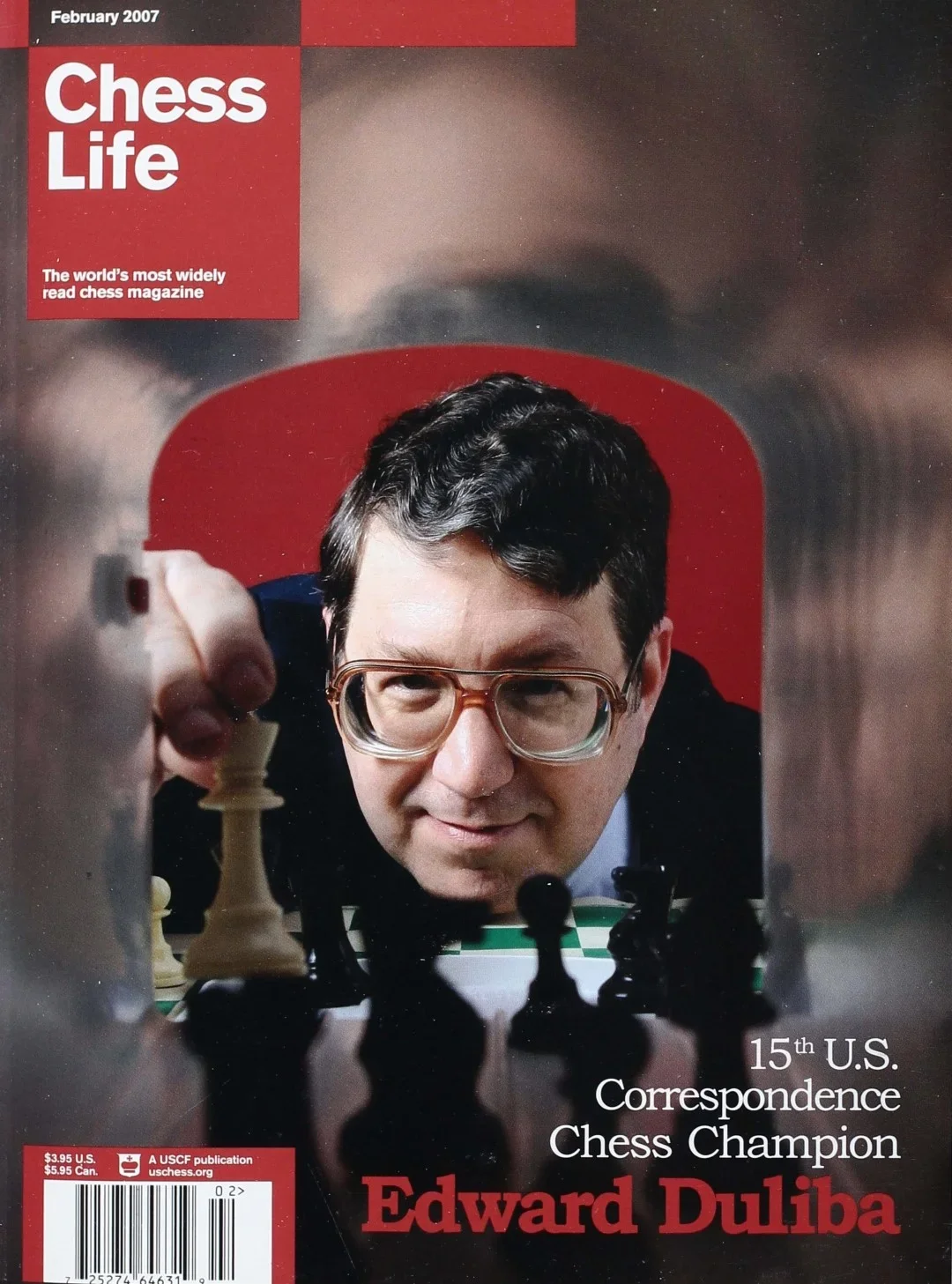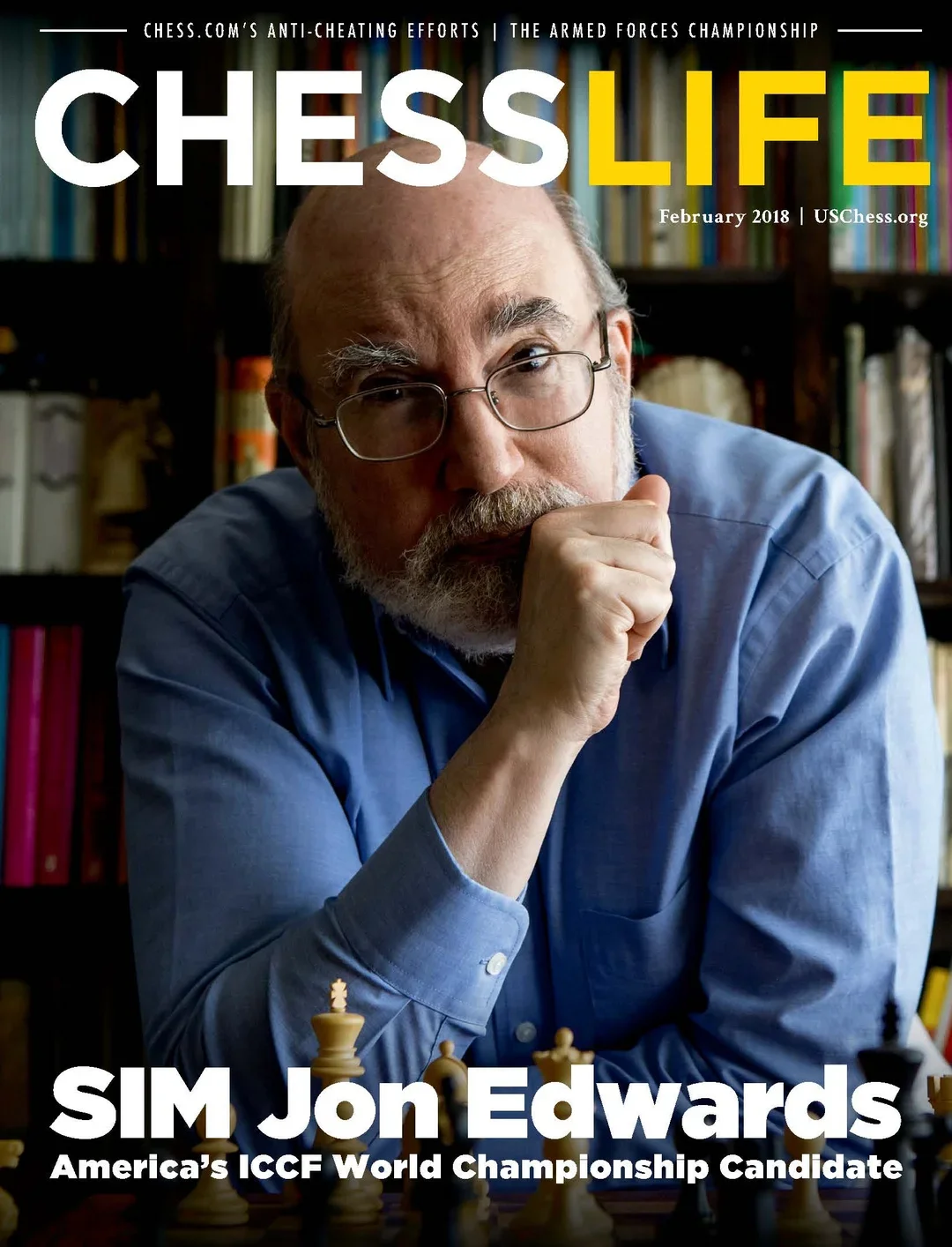Now that we are practicing social distancing, the weekend Swiss tournaments are cancelled, and the local chess club is closed (all through the foreseeable future), the COVID-19 pandemic is no cause for your chess to languish during these difficult and trying times. US Chess offers many forms of correspondence chess to make up for the loss of OTB competition. I am not going to offer arguments for either OTB vs correspondence chess. The rules of chess are the same for both. The only real difference between the two is the freedom that correspondence chess allows players between moves. Players are free to check books, magazines, the internet, and any other written resource at their disposal to help decide their next move. For US Chess play there is one form of assistance that is not permitted: chess-playing engines.
The term "correspondence chess" is somewhat of a misnomer in today’s world. Originally correspondence chess was played with postcards or letters, hence why many still call it today “postal chess.” These days it is also email, chess server websites, and the occasional fax. No matter what method is used to play correspondence chess, the idea has always been to create the highest level of play. Correspondence chess can let you explore openings you might not otherwise play in OTB. It certainly will improve your middle-game and hone your endgame technique. When starting out don't play too many games at once. If you play 5-10 games, it's easy to be tempted to move fast. Vice versa if you start out playing 20-30 games, you will be overloaded. You won’t have the time needed to take your game to that higher level. Play/analyze during your dedicated chess time, ideally daily. Set up the position on a board and analyze it in depth before moving. Regarding the use of a board and pieces, I still have a dozen or so “Post-A-Logs” that US Chess sold in the day. But I now use ChessBase software to maintain the game score, transmission times and reflection times. It also has an electronic board that you can use to go over the game. A Google search will also find you some free software that will also do the job. Again, I caution you. The use of any chess engine or chess playing algorithms of a software program, are prohibited in US Chess sanctioned correspondence chess tournaments. The current US Chess correspondence chess rules can be found here. I used to incorporate Excel spreadsheets in keeping the game score, etc. along with my board and pieces to analyze my games. But I was prone to the reoccurring probability of the dreaded (and cursed) recording error. No matter what you use, play over the game from the start to the current position, verifying that your game score is correct. Double check that the move your planning to send is indeed the move that goes out in the mailbox or into the ethereal world of the internet and email. Unfortunately, there have been times where I have not followed my own advice! Certain opponents can certainly attest to this. When you receive an opponent's move, take an analytical look at several possible lines. Time yourself and don't allow yourself to move until the analysis time is over. I recommend starting with 10-15 minutes of analysis per move. Some positions will of course require longer time, some will not. Don’t forget to write down your move! If you are sure what the right move is, don't spend more time contemplating. Simply play it. Select the move most consistent with basic chess principles, your gut and play it. Save your time for the important, difficult moves, and then use fully as much time as you need (depending upon the specified reflection time). When you have a move already prepared, don't send it if some new doubt emerges (your gut), but keep it. Take an extra day or two and check the position to resolve your doubts. My opponents over the years know that I rarely take more than a day to decide and send my moves. That has been my style. It has worked for me. On the other hand, I have played opponents that will always take longer. That’s their style. To quote from the chess blog website Tartajubow on Chess: “To win a won game is most important (whether it is OTB or correspondence chess)! Devote more time to your won positions than your lost ones. A mistake in a lost position counts for very little, but you lose a full point if you blunder in a won position and losing half the point is easier still.” Ain’t that the truth!
 Michael Buss (courtesy of subject)
Michael Buss (courtesy of subject)I was part of the “Fischer boom” of chess in the early 1970’s. I played in some weekend Swiss tournaments in Iowa and Nebraska. I also entered a couple Golden Knights postal tournaments. The start of college in 1974 at Iowa State University, leading to a 23-year career as a Naval officer in 1978 through the Navy ROTC program, put my chess playing days on hold. While on temporary duty at the Naval Station, Subic Bay, Philippines during the summer of 1984, I came across Walter Tevis’ novel The Queen’s Gambit. My interest in chess was reinvigorated! But it would have to be correspondence chess to accommodate my time what with the demands of the Navy and a young family. So, I “re-joined” US Chess, entering some postal chess “Class” and “Prize” tournaments. My game was steadily improving. I boldly ventured further, entering a Golden Knights section in the late 1980’s and the Electronic Knights in 2006. I also expanded my play to Correspondence Chess League of America and ICCF webserver events. When I re-commenced my postal chess career, I depended upon Modern Chess Openings, Basic Chess Endings by Reuben Fine and many other opening books. I added each volume of the Encyclopedia of Chess Openings to my ever- growing chess library. Now it’s databases for my correspondence play. They provide the most up to date (and sometimes up to the minute) theory on all openings if you want to be successful in correspondence chess. Earlier I mentioned openings. When I returned to correspondence chess, I played off beat openings such as the Orangutan, Ponziani and the Nimzovich Defense. It’s not to say that I didn’t have success. I realized to have any serious chances at doing better, I would have to revamp my responses to 1. e4. But that’s not also to say that I still don’t play these openings and occasionally essay an Evans, Scotch or Benko Gambit along the way! I have not abandoned the printed word. I subscribe to American Chess Magazine, New in Chess, ChessBase Magazine and of course Chess Life. There are also many websites and some books devoted to correspondence chess. An excellent book is The Complete Guide to Correspondence Chess by Alex Dunne, our own US Chess correspondence chess director. Alex’s book has long been a part of my chess library. It is available from the US Chess Sales website on clearance for $10. I highly recommend it! My other avocation for the past 45 years has been umpiring high school baseball. With the COVID-19 virus, the season was over before it started here in Indiana. At least with correspondence chess I can still look forward to each day and what the postman, email or webserver brings me!
Although Mr. Buss -- who has a master rating in ICCF play and is a three time winner of the Golden Knights -- was too modest to include examples of his own practice, we post some of his recent victories for those interested in what high-level correspondence play looks like. Check out the forthcoming May "The Check is in the Mail" column by Alex Dunne for more of Buss' games! - ed.
[pgn] [Event "USA/S91013 (USA)"] [Site "corr ICCF"] [Date "2019.05.22"] [Round "?"] [White "Buss, Michael D"] [Black "Caliguire, John J"] [Result "1-0"] [ECO "A13"] [WhiteElo "2197"] [BlackElo "2134"] [PlyCount "89"] [EventDate "2019.??.??"] [SourceTitle "ICCF Jan 2020"] [Source "ICCF ed TH"] [SourceDate "2020.02.04"] [SourceVersion "2"] [SourceVersionDate "2020.02.04"] [SourceQuality "1"] 1. Nf3 e6 2. c4 d5 3. g3 dxc4 4. Qa4+ Nd7 5. Bg2 a6 6. Nc3 Ngf6 7. O-O Be7 8. Qxc4 b5 9. Qb3 Bb7 10. a4 c6 11. d4 b4 12. Ne5 Qc8 13. Ne4 Nxe4 14. Bxe4 Nxe5 15. dxe5 c5 16. Qf3 Bxe4 17. Qxe4 O-O 18. Be3 Qc7 19. Rac1 Rac8 20. b3 Rfd8 21. f4 Rd5 22. Rc4 Qc6 23. Rfc1 a5 24. Kg2 g6 25. g4 g5 26. Rf1 h6 27. Qf3 Rd7 28. f5 Qd5 29. f6 Bd8 30. Re4 Bc7 31. h4 Bxe5 32. hxg5 hxg5 33. Bxg5 Bb2 34. Qf4 c4 35. Bh4 Qd2 36. Re3 Qc2 37. Re4 Qd2 38. Re3 Qc2 39. Rh3 Rd4 40. Qg5+ Qg6 41. Qxg6+ fxg6 42. f7+ Kf8 43. Bf6 Rxg4+ 44. Kf3 Bxf6 45. Kxg4 1-0 [/pgn]
[pgn] [Event "USA/S91013 (USA)"] [Site "corr ICCF"] [Date "2019.05.22"] [Round "?"] [White "Caliguire, John J"] [Black "Buss, Michael D"] [Result "0-1"] [ECO "B23"] [WhiteElo "2134"] [BlackElo "2197"] [PlyCount "88"] [EventDate "2019.??.??"] [SourceTitle "ICCF Jan 2020"] [Source "ICCF ed TH"] [SourceDate "2020.02.04"] [SourceVersion "2"] [SourceVersionDate "2020.02.04"] [SourceQuality "1"] 1. e4 c5 2. Nc3 a6 3. Nge2 b5 4. g3 e5 5. Bg2 Nf6 6. Nd5 Nxd5 7. exd5 d6 8. O-O Be7 9. b3 O-O 10. Bb2 Bg4 11. f4 exf4 12. Rxf4 Bh5 13. g4 Bg6 14. d3 Bg5 15. Rf1 Nd7 16. Nf4 a5 17. a4 c4 18. Nxg6 hxg6 19. axb5 cxb3 20. Kh1 Qb6 21. Ba3 bxc2 22. Qxc2 Ne5 23. h3 Rac8 24. Qb3 Be3 25. Be4 g5 26. Rae1 Bf4 27. Qa4 g6 28. Bb2 Rb8 29. d4 Nd7 30. Bc1 Qxb5 31. Qxb5 Rxb5 32. Bxf4 gxf4 33. Rxf4 a4 34. Kg2 a3 35. Ra1 Ra8 36. Kg3 Rb4 37. Bb1 Rc8 38. Ba2 Rc3+ 39. Rf3 Rxf3+ 40. Kxf3 Rxd4 41. Ke3 Rb4 42. Kd3 Rb2 43. Kc3 Rh2 44. Kb4 Kg7 0-1 [/pgn]
[pgn] [Event "USA/S71999 (USA)"] [Site "corr ICCF"] [Date "2017.10.16"] [Round "?"] [White "Sherwood, Russell"] [Black "Buss, Michael D"] [Result "0-1"] [ECO "B06"] [WhiteElo "2364"] [BlackElo "2143"] [PlyCount "128"] [EventDate "2017.??.??"] [SourceTitle "ICCF2018 re-edit"] [Source "Tim Harding"] [SourceDate "2020.02.05"] [SourceVersion "2"] [SourceVersionDate "2020.02.05"] [SourceQuality "1"] 1. e4 g6 2. d4 Bg7 3. Nc3 a6 4. f4 b5 5. Nf3 d6 6. Bd3 Nd7 7. e5 Nh6 8. a4 b4 9. Ne4 c5 10. exd6 cxd4 11. Bd2 a5 12. Ne5 O-O 13. Nc6 Qb6 14. Nxe7+ Kh8 15. Nd5 Qc6 16. Ne7 Qb6 17. Nd5 Qd8 18. O-O Bb7 19. Nc7 Rc8 20. Ng3 Qh4 21. Ne4 Qd8 22. Ng3 Nf6 23. Nb5 Nd5 24. h3 f5 25. Qe2 Nf7 26. Qe6 Qb6 27. Rae1 Nd8 28. Qe2 Bc6 29. Kh2 Nb7 30. b3 Qc5 31. Qf2 Nxd6 32. Nxd6 Qxd6 33. Ne2 Nf6 34. Rd1 Ne4 35. Qg1 Rfe8 36. Be1 g5 37. Bg3 g4 38. Bf2 Rcd8 39. Bh4 Bf6 40. Bxe4 Rxe4 41. Bxf6+ Qxf6 42. Ng3 Re3 43. Rd3 gxh3 44. gxh3 Rde8 45. Qf2 Rxd3 46. cxd3 Re3 47. Re1 Qe6 48. Rxe3 Qxe3 49. Kg1 Qxd3 50. Nf1 Qe4 51. Qg3 Bd5 52. Qg5 d3 53. Qf6+ Kg8 54. Qd8+ Kg7 55. Qd7+ Bf7 56. h4 Qxf4 57. Qxd3 Qg4+ 58. Ng3 Bxb3 59. Qxb3 f4 60. Qd5 Qxg3+ 61. Kf1 Qh3+ 62. Kg1 Qxh4 63. Qxa5 Qg3+ 64. Kf1 f3 0-1 [/pgn]
Quick Links for those interested in Correspondence Chess:
US Chess Correspondence Info Correspondence Chess League of America International Correspondence Chess Federation "The Check is in the Mail" columns by Alex Dunne
Categories
Archives
- January 2026 (6)
- December 2025 (27)
- November 2025 (29)
- October 2025 (39)
- September 2025 (27)
- August 2025 (29)
- July 2025 (43)
- June 2025 (25)
- May 2025 (24)
- April 2025 (29)
- March 2025 (29)
- February 2025 (20)
- January 2025 (24)
- December 2024 (34)
- November 2024 (18)
- October 2024 (35)
- September 2024 (23)
- August 2024 (27)
- July 2024 (44)
- June 2024 (27)
- May 2024 (31)
- April 2024 (51)
- March 2024 (34)
- February 2024 (25)
- January 2024 (26)
- December 2023 (29)
- November 2023 (26)
- October 2023 (37)
- September 2023 (27)
- August 2023 (37)
- July 2023 (47)
- June 2023 (33)
- May 2023 (37)
- April 2023 (45)
- March 2023 (37)
- February 2023 (28)
- January 2023 (31)
- December 2022 (23)
- November 2022 (32)
- October 2022 (31)
- September 2022 (19)
- August 2022 (39)
- July 2022 (32)
- June 2022 (35)
- May 2022 (21)
- April 2022 (31)
- March 2022 (33)
- February 2022 (21)
- January 2022 (27)
- December 2021 (36)
- November 2021 (34)
- October 2021 (25)
- September 2021 (25)
- August 2021 (41)
- July 2021 (36)
- June 2021 (29)
- May 2021 (29)
- April 2021 (31)
- March 2021 (33)
- February 2021 (28)
- January 2021 (29)
- December 2020 (38)
- November 2020 (40)
- October 2020 (41)
- September 2020 (35)
- August 2020 (38)
- July 2020 (36)
- June 2020 (46)
- May 2020 (42)
- April 2020 (37)
- March 2020 (60)
- February 2020 (38)
- January 2020 (45)
- December 2019 (34)
- November 2019 (35)
- October 2019 (42)
- September 2019 (45)
- August 2019 (56)
- July 2019 (44)
- June 2019 (35)
- May 2019 (40)
- April 2019 (48)
- March 2019 (61)
- February 2019 (39)
- January 2019 (30)
- December 2018 (29)
- November 2018 (51)
- October 2018 (45)
- September 2018 (29)
- August 2018 (49)
- July 2018 (35)
- June 2018 (31)
- May 2018 (39)
- April 2018 (31)
- March 2018 (26)
- February 2018 (33)
- January 2018 (30)
- December 2017 (26)
- November 2017 (24)
- October 2017 (30)
- September 2017 (30)
- August 2017 (31)
- July 2017 (28)
- June 2017 (32)
- May 2017 (26)
- April 2017 (37)
- March 2017 (28)
- February 2017 (30)
- January 2017 (27)
- December 2016 (29)
- November 2016 (24)
- October 2016 (32)
- September 2016 (31)
- August 2016 (27)
- July 2016 (24)
- June 2016 (26)
- May 2016 (19)
- April 2016 (30)
- March 2016 (36)
- February 2016 (28)
- January 2016 (32)
- December 2015 (26)
- November 2015 (23)
- October 2015 (16)
- September 2015 (28)
- August 2015 (28)
- July 2015 (6)
- June 2015 (1)
- May 2015 (2)
- April 2015 (1)
- February 2015 (3)
- January 2015 (1)
- December 2014 (1)
- July 2010 (1)
- October 1991 (1)
- August 1989 (1)
- January 1988 (1)
- December 1983 (1)









